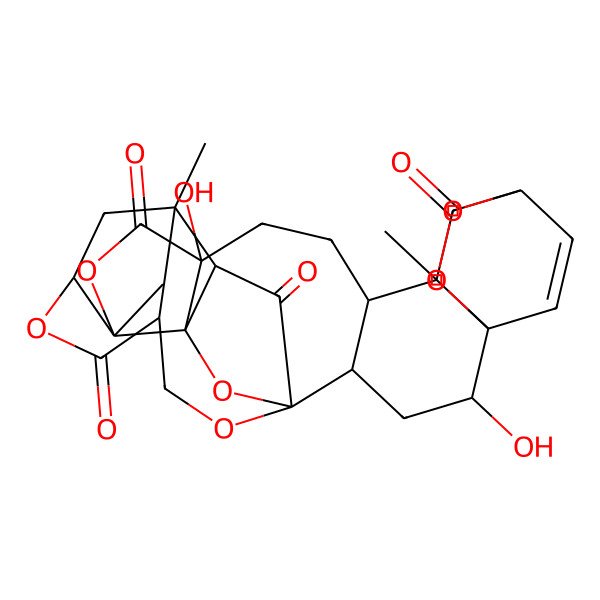Physalin K
| Internal ID | 6b6e8381-2420-4bfd-852e-c2ea3e52307c |
| Taxonomy | Lipids and lipid-like molecules > Steroids and steroid derivatives > Physalins and derivatives |
| IUPAC Name | 2,19-dihydroxy-13,16,23-trimethyl-6,10,17,26,27,30-hexaoxanonacyclo[23.2.2.15,14.15,15.01,23.04,22.08,13.011,16.015,19]hentriacont-28-ene-9,18,24,31-tetrone |
| SMILES (Canonical) | CC12CC3C4(C56C1C(=O)C(O5)(C7CC(C89C=CC(C(=O)C8(C7CCC6(C(=O)O4)O)C)OO9)O)OCC2C(=O)O3)C |
| SMILES (Isomeric) | CC12CC3C4(C56C1C(=O)C(O5)(C7CC(C89C=CC(C(=O)C8(C7CCC6(C(=O)O4)O)C)OO9)O)OCC2C(=O)O3)C |
| InChI | InChI=1S/C28H30O12/c1-22-9-16-24(3)28-17(22)19(31)27(39-28,35-10-13(22)20(32)36-16)12-8-15(29)26-7-5-14(38-40-26)18(30)23(26,2)11(12)4-6-25(28,34)21(33)37-24/h5,7,11-17,29,34H,4,6,8-10H2,1-3H3 |
| InChI Key | IRYOOASWRCIZCK-UHFFFAOYSA-N |
| Popularity | 4 references in papers |
| Molecular Formula | C28H30O12 |
| Molecular Weight | 558.50 g/mol |
| Exact Mass | 558.17372639 g/mol |
| Topological Polar Surface Area (TPSA) | 164.00 Ų |
| XlogP | -0.60 |
| CHEBI:187118 |
| 2,19-dihydroxy-13,16,23-trimethyl-6,10,17,26,27,30-hexaoxanonacyclo[23.2.2.15,14.15,15.01,23.04,22.08,13.011,16.015,19]hentriacont-28-ene-9,18,24,31-tetrone |

| Target | Value | Probability (raw) | Probability (%) |
|---|---|---|---|
| No predicted properties yet! | |||
Proven Targets:
| CHEMBL ID | UniProt ID | Name | Min activity | Assay type | Source |
|---|---|---|---|---|---|
| No proven targets yet! | |||||
Predicted Targets (via Super-PRED):
| CHEMBL ID | UniProt ID | Name | Probability | Model accuracy |
|---|---|---|---|---|
| CHEMBL253 | P34972 | Cannabinoid CB2 receptor | 97.91% | 97.25% |
| CHEMBL4261 | Q16665 | Hypoxia-inducible factor 1 alpha | 97.37% | 85.14% |
| CHEMBL3251 | P19838 | Nuclear factor NF-kappa-B p105 subunit | 95.88% | 96.09% |
| CHEMBL5619 | P27695 | DNA-(apurinic or apyrimidinic site) lyase | 94.58% | 91.11% |
| CHEMBL3137262 | O60341 | LSD1/CoREST complex | 93.97% | 97.09% |
| CHEMBL4203 | Q9HAZ1 | Dual specificity protein kinase CLK4 | 92.44% | 94.45% |
| CHEMBL1871 | P10275 | Androgen Receptor | 92.03% | 96.43% |
| CHEMBL1806 | P11388 | DNA topoisomerase II alpha | 91.33% | 89.00% |
| CHEMBL1994 | P08235 | Mineralocorticoid receptor | 90.88% | 100.00% |
| CHEMBL1951 | P21397 | Monoamine oxidase A | 89.90% | 91.49% |
| CHEMBL3108638 | O15164 | Transcription intermediary factor 1-alpha | 88.86% | 95.56% |
| CHEMBL4303 | P08238 | Heat shock protein HSP 90-beta | 86.81% | 96.77% |
| CHEMBL5608 | Q16288 | NT-3 growth factor receptor | 86.57% | 95.89% |
| CHEMBL4481 | P35228 | Nitric oxide synthase, inducible | 86.53% | 94.80% |
| CHEMBL218 | P21554 | Cannabinoid CB1 receptor | 86.31% | 96.61% |
| CHEMBL4478 | Q00975 | Voltage-gated N-type calcium channel alpha-1B subunit | 85.79% | 97.14% |
| CHEMBL299 | P17252 | Protein kinase C alpha | 84.84% | 98.03% |
| CHEMBL259 | P32245 | Melanocortin receptor 4 | 81.68% | 95.38% |
| CHEMBL4026 | P40763 | Signal transducer and activator of transcription 3 | 81.00% | 82.69% |
Below are displayed all the plants proven (via scientific papers) to contain this
compound!
To see more specific details click the taxa you are interested in.
To see more specific details click the taxa you are interested in.
| Physalis minima |
| PubChem | 73816389 |
| LOTUS | LTS0181709 |
| wikiData | Q104403293 |